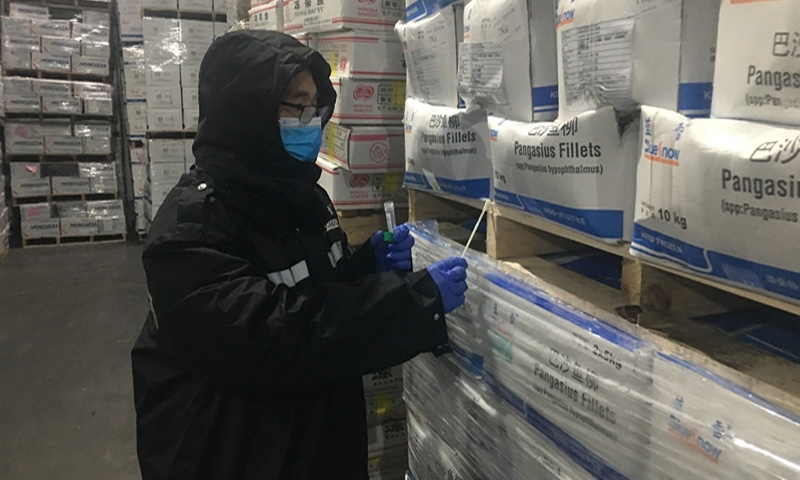
(Photo: Global Times)
Local market supervision bureau in Ningbo, East China's Zhejiang Province, inspected five companies which imported frozen white shrimps from Ecuador and all the samples tested negative for COVID-19 on July 11.
A transit inspection process on imported cold-chain foods has been implemented in Ningbo, East China's Zhejiang Province, on Tuesday, to inspect and manage imported cold-chain foods through Ningbo customs as well as customs in other cities as COVID-19 risks surge in imported cold-chain cargo while the pandemic spirals overseas with winter approaching, reported Ningbo Evening News.
Imported cold-chain foods entering Ningbo through Ningbo Port or ports in other cites which are stored, processed and sold in Ningbo will have to be first transferred to a centralized inspection station. However, those imported food products which have been disinfected at the port will be excluded.
According to Chen Yuangang, vice director of Ningbo Food Safety Commission Office and vice director of Ningbo Market Supervision Bureau, as an important port city and a key city of foreign trade, Ningbo is facing tremendous pressure from imported goods.
Statistics from Ningbo's customs show the total imports to Ningbo between January and October this year amounted to 276.72 billion yuan ($41.95 billion), up 5.2 percent year-on-year.
"At the moment, China has a great demand for imported foods such as meat and aquatic products. Satisfying domestic consumers' needs while ensuring epidemic prevention measures are upheld is a challenge for all related departments," Chen told the Ningbo Evening News.
Previously, Shanghai, Nanjing in East China's Jiangsu Province and Shenzhen in South China's Guangdong Province had all adopted a centralized transit inspection and management practice for imported foods and goods.
Learning from the experiences of these cities, Ningbo has worked out more detailed practices that are optimized to the local conditions.
Two logistics companies — including COSCO Shipping Logistics (Ningbo) Co and VX Cold Chain Logistics — have been chosen as the transit warehouse for centralized inspection.
Currently, each batch of imported aquatic products to Ningbo will undergo nucleic acid testing and spot checks will be implemented on certain imported meats.
In the next phase of prevention, Ningbo will disinfect imported cold-chain foods in a larger range and form a united standardized operation, Chen said.


